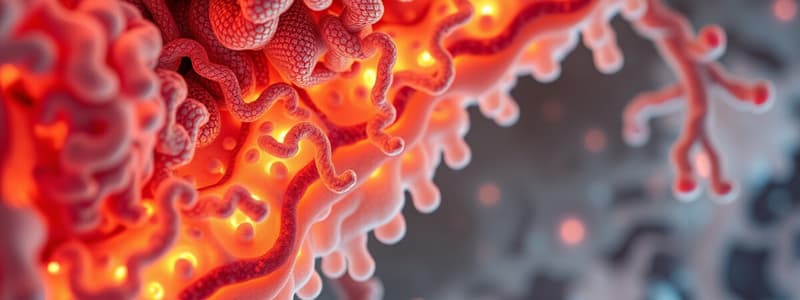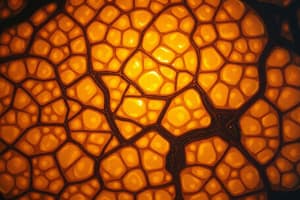Podcast
Questions and Answers
What are the two types of Endoplasmic Reticulum?
What are the two types of Endoplasmic Reticulum?
Rough Endoplasmic Reticulum and Smooth Endoplasmic Reticulum
What is the role of Rough Endoplasmic Reticulum?
What is the role of Rough Endoplasmic Reticulum?
- Carbohydrate metabolism
- Protein synthesis (correct)
- Lipid synthesis
- Detoxification of drugs
Smooth Endoplasmic Reticulum contains ribosomes on its surface.
Smooth Endoplasmic Reticulum contains ribosomes on its surface.
False (B)
What is the function of Smooth Endoplasmic Reticulum regarding drugs?
What is the function of Smooth Endoplasmic Reticulum regarding drugs?
What calcium-related function does the Smooth Endoplasmic Reticulum perform?
What calcium-related function does the Smooth Endoplasmic Reticulum perform?
What is the term used for Smooth Endoplasmic Reticulum in muscle cells?
What is the term used for Smooth Endoplasmic Reticulum in muscle cells?
Which types of cells primarily contain Smooth Endoplasmic Reticulum?
Which types of cells primarily contain Smooth Endoplasmic Reticulum?
What is the primary function of the Golgi apparatus?
What is the primary function of the Golgi apparatus?
What structure is formed from the breakdown of cisternae at the Trans face of the Golgi apparatus?
What structure is formed from the breakdown of cisternae at the Trans face of the Golgi apparatus?
Which of the following statements about the Golgi apparatus is true?
Which of the following statements about the Golgi apparatus is true?
The shape of the Cis face of the Golgi apparatus is described as:
The shape of the Cis face of the Golgi apparatus is described as:
During which cellular process does the Golgi apparatus form vesicles in plant cells?
During which cellular process does the Golgi apparatus form vesicles in plant cells?
Study Notes
Endoplasmic Reticulum Overview
- Network of tubules extending from the nuclear membrane to the plasma membrane.
- Single membrane bound organelle with tubular membranes known as Cisternae.
- Two types: Rough Endoplasmic Reticulum (RER) and Smooth Endoplasmic Reticulum (SER).
Rough Endoplasmic Reticulum (RER)
- Contains ribosomes on its surface giving it a rough appearance.
- Primary function is protein synthesis.
- Synthesized proteins can be stored in RER or transported out into the cytoplasm via channels.
- Provides mechanical support to the cell structure.
Smooth Endoplasmic Reticulum (SER)
- Features a smooth surface without ribosomes.
- Plays a vital role in carbohydrate metabolism.
- Involved in lipid synthesis, including oils, phospholipids, and steroids.
- Aids in drug detoxification processes.
- Functions in calcium ion storage, releasing ions for muscle contraction and nerve impulse transmission.
- Commonly found in steroid-producing cells such as adipose, interstitial, and glycogen-storing cells of the liver and muscles.
- In muscle cells, it is referred to as Sarcoplasmic Reticulum, facilitating material transport within the cell and offering mechanical support.
Discovery and Structure
- Discovered by Camillo Golgi in 1898.
- Present in all eukaryotic cells and characterized as a single membrane-bound organelle.
- Composed of stacks of flattened membrane-bound sacs known as cisternae.
- Features a complex system of interconnected tubules.
Functional Faces
- Two distinct faces:
- Cis Face: Convex shape; serves as the forming face where substances enter.
- Trans Face: Concave shape; acts as the maturing face where substances exit.
Packaging and Transport
- Cisternae break off from the Trans face to form vesicles, which are released into the cytoplasm.
- Often referred to as the "Post Office of the Cell" due to its role in receiving, modifying, packaging substances into vesicles, and transporting them.
- Essential for cell secretion; substances produced by ribosomes enter the endoplasmic reticulum and Golgi apparatus for modification and packaging.
Examples of Function
- Granules containing digestive enzymes are formed by the pancreas through the Golgi apparatus.
- Proteins undergo modification within the Golgi, such as:
- Addition of lipids to create lipoproteins.
- Addition of carbohydrates to form glycoproteins.
Organelle Production
- Golgi apparatus produces various organelles such as peroxisomes, lysosomes, and glyoxysomes.
Role in Plant Cells
- In plant cells, the Golgi complex facilitates the formation of vesicles during cytokinesis.
- Vesicles arrange at the cell equator to create the Phragmoplast, which ultimately leads to the formation of the cell wall.
Studying That Suits You
Use AI to generate personalized quizzes and flashcards to suit your learning preferences.
Description
This quiz covers the structure and function of the Endoplasmic Reticulum, highlighting the differences between Rough and Smooth ER. Test your knowledge on the roles of these organelles in protein synthesis and transport. Ideal for students studying cellular biology.




